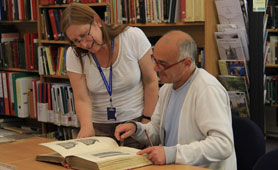Creating a vision statement
 Summary of activity
Summary of activity
Cumbria Archive Service has updated the vision for their archive service to reflect the direction and purpose of the archive service in the 21st century. The aim was to create a striking vision statement which
- explained the value of archives to Cumbrian people
- had meaning and resonance for staff, service users and other stakeholders
- played an active part in advocacy for the Archive Service
The new vision was developed over a period of two months during summer 2013.
Challenges
Cumbria Archive Service operates over a very wide geographical area. The service is delivered through four public archive centres which are up to 85 miles apart. Communications can be challenging, as is fostering a consistent approach and common sense of purpose between small teams in four widely dispersed sites. Staff work in very different roles – front-line service, collection management, conservation, digitisation. Developing a vision which everyone could relate to was daunting.
Enthusing staff about vision statements can be difficult – vision statements can appear as management tick-box exercises which are rather divorced from the busy realities of delivering front-line services. Engaging staff and encouraging them to ‘buy in’ to the vision required consideration and planning.
When developing a vision it can also be very difficult to describe the purpose of the service and its ambitions in a concise way that is accessible to people who may never have used archives before.
Responding to the challenges
Engaging with all the staff at the very start avoided the ‘top down’ approach of consulting staff about a draft vision written by the management team.
The County Archivist hosted a staff meeting at each site. Staff were encouraged to think beforehand about why there was an archive service, what its purpose was, its value to Cumbria and how their own roles and those of their colleagues contributed to this. This resulted in lively discussions where staff contributed fascinating and excellent ideas that highlighted some consistent themes about key values.
Staff discussed all aspects of the archive service, such as preservation and conservation, digitisation, electronic service delivery, collection management, outreach, searchroom and enquiry services. They also considered what volunteers, partners and staff brought to the archive service. From there, staff explored the impact of the service, from preserving collections of great value, to widening audiences, and helping people of all ages learn and solve problems. Ultimately this led to a discussion about the bigger picture:
- potentially archives have a universal appeal
- fundamental to people’s sense of identity and pride
- supporting democratic accountability
- promoting tourism and economic benefits
- underpinning their parent authority’s activities
Following the discussions, they condensed the feedback to produce a concise A4-sized poster explaining what archives are, outlining the service’s vision for delivering an archive service for everyone in Cumbria, and listing the key objectives for the archive service to achieve that vision.
What were the outcomes?
The staff consultation produced a strapline and vision statement which conveys quickly the key reasons why archives are important:
‘Your History, Your Place – Be Part of It!’
Cumbria’s archives are here for everyone, a unique, exciting and inspiring resource that can help everyone explore and appreciate what is so special about Cumbria, its people and places.
Archives are profoundly important for learning. They capture the imaginations of young people, inspiring them to take an interest in their surroundings. For adult learners, archives satisfy our natural thirst for knowledge, as well as building skills and confidence.
The archives are Cumbria’s collective memory, providing authoritative evidence to help people solve problems and find out the truth. Archives encourage pride in individual and community identities, and bring our past alive as our frame of reference for the present and future.
The new vision statement received a very positive reaction from staff, councillors and other stakeholders.
What went well? What didn’t go quite as well?
Staff felt this was a really positive exercise that produced a vision statement Cumbria Archive Service feels proud of.
The key learning was a reminder that the staff are very talented and dedicated and that good staff engagement is very productive. This worked on a number of levels. The vision is far more meaningful to staff since they helped to create it and everyone in the service can use it to promote what the service does and why it is important. The sum of everyone’s ideas added up to a much more compelling advocacy tool – a considerable improvement on the former vision statement. During the discussions, staff gained a greater appreciation of the importance of their own roles, a better mutual understanding of the value that every individual contributes to the service and a clearer sense of how all four sites collectively work together to deliver an archive service to the people of Cumbria.
Developing this work in the future
The archive service will benefit from the new vision statement for some time to come but the service will aim to make service-wide staff engagement across the four dispersed sites a much more regular feature of developing services and managing change for the future.
Find out more about Cumbria Archive Service .
To find out more about the case study, please email Anne Rowe, County Archivist.